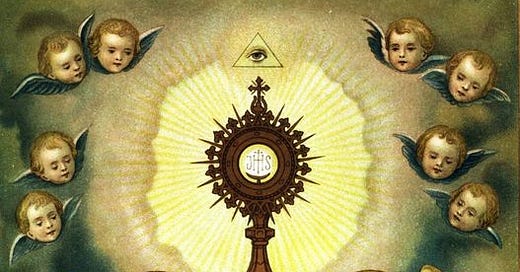Meditation for Tuesday after the Second Sunday after Pentecost, June 24, 2025: The Eucharist the Consolation of the Christian.
Excerpt from the book Meditations for all the Days of the Year
The Eucharist the Consolation of the Christian
Preparation
We will today consider the Eucharist:
As the strength of the Christian.
As his consolation and joy.
We will then make the resolutions:
To have recourse to the Blessed Sacrament in our temptations, our troubles, and our discouragements.
To cherish, as being the happiest and the best-employed instants of our life, the moments which we are able to spend in presence of the Blessed Sacrament.
Our spiritual nosegay shall be the words of the Psalmist: “How lovely are Thy tabernacles, O Lord of hosts! My soul longeth and fainteth for the courts of the Lord.” (Psalm 83:2)
Let us come back to the holy tabernacle; let us prostrate ourselves, filled with sentiments of reverence and love, before our God, who Himself burns with charity for us. (Psalm 94:61) Praise, love, and benediction be to the Lamb who is immolated for us!
First Point
The Eucharist is the Strength of the Christian.
Experience proves this truth to us; it was the Eucharist which gave martyrs courage to brave torments and death; it is the Eucharist which gives the Christian virgin devotedness to enable her to succor all kinds of human woes in hospitals, on fields of battle, amidst pestilence and a thousand other perils; the soul which sees a God give Himself wholly to it feels that it is but just that it should give itself wholly to Him; it conceives not only a desire to do so, but also a firm resolution, a holy passion, which makes it find happiness in sacrifices, and renders it stronger than all obstacles.
“He that eateth this bread” says Jesus Christ, “shall live forever” (John 6:59); he will derive from Me strength to gain eternal life (Ibid. 552). And whilst the Eucharist renders the Christian stronger by raising him above himself, sometimes as high as the most sublime virtues, it renders the enemy of our salvation weaker; for, as the councils and the Fathers of the Church say, it moderates the fire of the passions and calms the ardor of concupiscence.
These are facts proved by experience: as long as we frequent the sacraments, we are sustained in the practice of good; as soon as we abandon them, we become relaxed and tepid, and we fall. The soul deprived of the nourishment which gives it strength and life falls away and dies.
Second Point
The Eucharist is the Consolation of the Christian.
How sad life would be without the Eucharist! Our churches would no longer have anything in them which would speak to the heart, nothing to which the heart could speak. The whole world would then be nothing but a place of exile, for it would not possess any memorial of our country, which is heaven. All the troubles of life would be left without a consoler, darkness would be devoid of light, doubts would seek in vain for counsel. But with the Eucharist, all is changed into joy and happiness. Our churches become a Paradise in which the soul can enjoy in advance the delights of heaven, and exclaim with the Psalmist: “Oh, how lovely are Thy tabernacles, O Lord of hosts. My soul longeth and fainteth for the courts of the Lord.” (Psalm 83:2)
It is there that we find a foretaste of our country. When we possess Thee, O my God, we have all things, and the contented heart has nothing more to desire (Psalm 72:253). We read in the Old Testament that Anne, the mother of Samuel, found no consolation in anything except in going and letting her afflicted heart overflow before the ark of the Lord; how much more, then, when we are in trouble or in some pressing need, shall we find true consolation at the foot of our divine Ark, which is Jesus in the Blessed Sacrament!
Never do we have recourse to Him there without bringing back with us solace for our heart. (Hebrews 10:224) Men are only “troublesome comforters,” Job said (Job 16:25). But Thou, O God of our tabernacles, Thou art the true Consoler; Thou dost raise up the heart which is cast down, Thou dost bring back serenity to the afflicted soul, and Thou makest repose and peace to follow troubles.
Oh, how well did it become Thee to say: “Come to Me, all you that labor and are burdened, and I will refresh you.” (Matthew 11:28) The soul which recounts its sorrows to Thee in simplicity, as a friend speaks to a friend, or as a child to its father, always returns from Thee consoled; and those deprive themselves of the sweetest joys of their life who do not know how to come and pour out their afflictions before Thy tabernacles.
Meditations for All the Days of the Year, Vol. 3 by Reverend M. Hamon, S. S. (Benzinger Brothers, 1894, pages 255-259).
“Come let us adore and fall down: and weep before the Lord that made us.” — Psalm 94:6
“He that eateth my flesh, and drinketh my blood, hath everlasting life: and I will raise him up in the last day.” — John 6:55
“For what have I in heaven? and besides thee what do I desire upon earth?” — Psalm 72:25
“Let us draw near with a true heart in fulness of faith, having our hearts sprinkled from an evil conscience, and our bodies washed with clean water.” Hebrews 10:22
“I have often heard such things as these: you are all troublesome comforters.” — Job 16:2




Today June 24 is the nativity of John The Baptist.
I can’t take the Eucharist for granted because I don’t live anywhere near a traditional Catholic Church. I have to get the Eucharist a couple times per year when a missionary priest comes to my house.